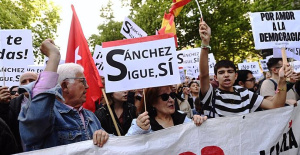Shows concern about the perceived politicization of the system for electing the governing body of judges
MADRID, 5 Dic. (EUROPA PRESS) -
The Group of States against Corruption (GRECO) of the Council of Europe has lamented this Monday the lack of progress in the renewal of the General Council of the Judiciary (CGPJ) and has urged the "authorities" to unblock this "critical" situation of blockade that yesterday Sunday reached four years due to the inability of the political formations to reach an agreement to appoint the 20 members of the governing body of judges.
"This is a highly unsatisfactory situation; the authorities are urged to take determined measures in this key area," GRECO pointed out in the conclusions of its evaluation report on the recommendations made to Spain in the area of corruption as a result of the Fourth Evaluation Round in 2014 with respect to parliamentarians, judges and prosecutors.
In the document, the Group of States has recalled that in the past it recommended Spain to carry out an evaluation of the legislative framework by which the CGPJ is governed, as well as its effects on the "real and perceived independence" of the body of government of the judges against "any undue influence" to correct the deficiencies detected.
In this edition, as it did in previous reports, the Group has concluded that said recommendation has not yet been implemented and has once again reiterated the need to eliminate the selection of judicial turn by politicians. In his opinion, the CGPJ selection system and the perceived politicization of it "is not a minor concern."
On the sidelines, he has indicated that he considers it "very worrying" that the acting CGPJ cannot make discretionary appointments in the judicial leadership as a result of the reform of the Organic Law of the Judiciary (LOPJ) that was approved in March 2021.
As specified by GRECO, on this occasion, the Spanish authorities have warned that the negotiations on the renewal of the CGPJ resumed last October, but were frustrated at the end of that same month.
The Group of States has lamented the "lack of positive results to implement the recommendation" and has once again emphasized the Council of Europe standards on the choice of judicial turn in judicial councils.
GRECO has insisted that, when there is a mixed composition of the judicial councils, the norms establish that "judges must be chosen by their peers" and that the political authorities must not be "involved" in "any stage" of the process of selection.
"Last but not least, the four-year deadlock in the appointment of the CGPJ is a matter of critical concern, which must be addressed as a matter of priority," the Council stressed.
Within the framework of the document, GRECO recalled that it had also recommended to Spain that objective criteria and evaluation requirements be established in law for the appointment of senior officials in the Judiciary to ensure that such appointments "do not call into question the independence , impartiality and transparency of this process".
The Group of States against Corruption assessed this recommendation as partially implemented in the Second Compliance Report. While acknowledging the steps taken to increase transparency in the system for appointing the highest ranks of the judiciary, he considered that more could have been done to simplify the applicable requirements and procedures in this area.
On this occasion, there has been no progress because the Spanish authorities have indicated that -since the CGPJ has not been renewed- "there is nothing new to report on this matter". Thus, GRECO has lamented "the lack of new developments in this area".

 Exploring Cardano: Inner Workings and Advantages of this Cryptocurrency
Exploring Cardano: Inner Workings and Advantages of this Cryptocurrency Seville.- Economy.- Innova.- STSA inaugurates its new painting and sealing hangar in San Pablo, for 18 million
Seville.- Economy.- Innova.- STSA inaugurates its new painting and sealing hangar in San Pablo, for 18 million Innova.- More than 300 volunteers join the Andalucía Compromiso Digital network in one month to facilitate access to ICT
Innova.- More than 300 volunteers join the Andalucía Compromiso Digital network in one month to facilitate access to ICT Innova.-AMP.- Ayesa acquires 51% of Sadiel, which will create new technological engineering products and expand markets
Innova.-AMP.- Ayesa acquires 51% of Sadiel, which will create new technological engineering products and expand markets Abascal (Vox) criticizes that Sánchez is "victimizing" himself and calls for elections after his possible resignation
Abascal (Vox) criticizes that Sánchez is "victimizing" himself and calls for elections after his possible resignation Carlos Alcaraz reaches the round of 16 in Madrid without breaking a sweat
Carlos Alcaraz reaches the round of 16 in Madrid without breaking a sweat Some 5,000 people demonstrate in front of Congress for democracy, hours before Sánchez's decision
Some 5,000 people demonstrate in front of Congress for democracy, hours before Sánchez's decision STATEMENT: Intelligent systems used in the construction of the deepest underwater tunnel in China
STATEMENT: Intelligent systems used in the construction of the deepest underwater tunnel in China How Blockchain in being used to shape the future
How Blockchain in being used to shape the future Not just BTC and ETH: Here Are Some More Interesting Coins Worth Focusing on
Not just BTC and ETH: Here Are Some More Interesting Coins Worth Focusing on UPV students build a prototype of a wooden house to move to Equatorial Guinea
UPV students build a prototype of a wooden house to move to Equatorial Guinea The UA opens the call for the Impulso 2024 Awards for the best innovative business initiatives
The UA opens the call for the Impulso 2024 Awards for the best innovative business initiatives ALI, virtual assistant from Alicante, internationally recognized by the OECD
ALI, virtual assistant from Alicante, internationally recognized by the OECD Retrópolis brings the golden age of video games and computing to the UPV
Retrópolis brings the golden age of video games and computing to the UPV A million people demonstrate in France against Macron's pension reform
A million people demonstrate in France against Macron's pension reform Russia launches several missiles against "critical infrastructure" in the city of Zaporizhia
Russia launches several missiles against "critical infrastructure" in the city of Zaporizhia A "procession" remembers the dead of the Calabria shipwreck as bodies continue to wash up on the shore
A "procession" remembers the dead of the Calabria shipwreck as bodies continue to wash up on the shore Prison sentences handed down for three prominent Hong Kong pro-democracy activists
Prison sentences handed down for three prominent Hong Kong pro-democracy activists ETH continues to leave trading platforms, Ethereum balance on exchanges lowest in 3 years
ETH continues to leave trading platforms, Ethereum balance on exchanges lowest in 3 years Investors invest $450 million in Consensys, Ethereum incubator now valued at $7 billion
Investors invest $450 million in Consensys, Ethereum incubator now valued at $7 billion Alchemy Integrates Ethereum L2 Product Starknet to Enhance Web3 Scalability at a Price 100x Lower Than L1 Fees
Alchemy Integrates Ethereum L2 Product Starknet to Enhance Web3 Scalability at a Price 100x Lower Than L1 Fees Mining Report: Bitcoin's Electricity Consumption Declines by 25% in Q1 2022
Mining Report: Bitcoin's Electricity Consumption Declines by 25% in Q1 2022 Oil-to-Bitcoin Mining Firm Crusoe Energy Systems Raised $505 Million
Oil-to-Bitcoin Mining Firm Crusoe Energy Systems Raised $505 Million Microbt reveals the latest Bitcoin mining rigs -- Machines produce up to 126 TH/s with custom 5nm chip design
Microbt reveals the latest Bitcoin mining rigs -- Machines produce up to 126 TH/s with custom 5nm chip design Bitcoin's Mining Difficulty Hits a Lifetime High, With More Than 90% of BTC Supply Issued
Bitcoin's Mining Difficulty Hits a Lifetime High, With More Than 90% of BTC Supply Issued The Biggest Movers are Near, EOS, and RUNE during Friday's Selloff
The Biggest Movers are Near, EOS, and RUNE during Friday's Selloff Global Markets Spooked by a Hawkish Fed and Covid, Stocks and Crypto Gain After Musk Buys Twitter
Global Markets Spooked by a Hawkish Fed and Covid, Stocks and Crypto Gain After Musk Buys Twitter Bitso to offset carbon emissions from the Trading Platform's ERC20, ETH, and BTC Transactions
Bitso to offset carbon emissions from the Trading Platform's ERC20, ETH, and BTC Transactions Draftkings Announces 2022 College Hoops NFT Selection for March Madness
Draftkings Announces 2022 College Hoops NFT Selection for March Madness



























